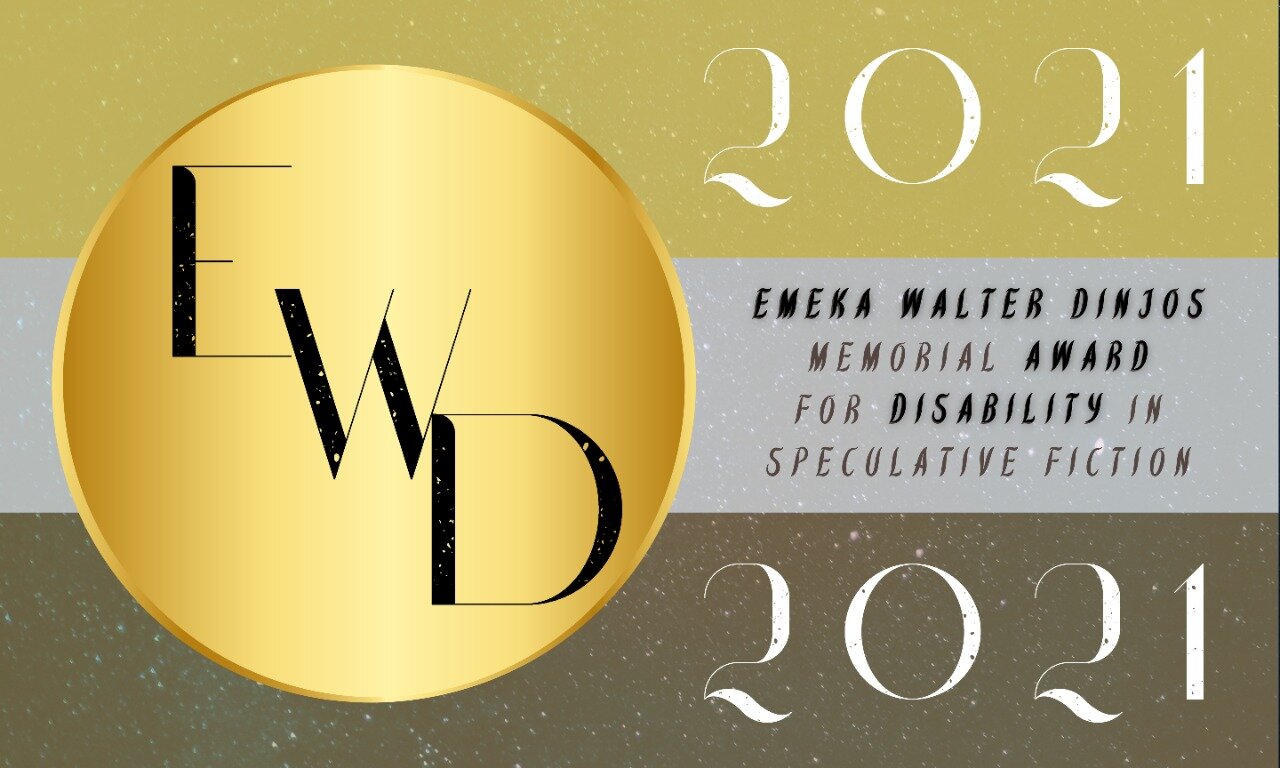The Emeka Walter Dinjos Memorial Award For Disability In Speculative Fiction
The Emeka Walter Dinjos Memorial Award For Disability In Speculative Fiction founded by Oghenechovwe Donald Ekpeki, aims to award disability in speculative fiction in two ways. One, by awarding a writer of speculative fiction for their representation or portrayal of disability in a world of speculative fiction, whatever their health status; and two, by awarding a disabled writer for a work of speculative fiction in general, whatever the focus of the work may be.
Each of the two awards will come with a cash prize of $250USD. For the moment, the awards will be awarded only to writers of short fiction, but in the future may grow to encompass other lengths and forms of speculative writing. These awards were born out of a need to provide assistance for disabled speculative fiction writers struggling with various maladies, and to encourage the representation of disability in speculative fiction.
While not exactly a fortune, the hope is that these funds will assist the winner(s) yearly to be able to cater to small needs that help them manage their ailments (like insulin and other medications) or simply provide self care of any kind they choose.
Administration
The awards will be given by Oghenechovwe Donald Ekpeki, the awards administrator, with special recommendations from writers and editors like Mazi Nwonwu of Omenana, Lezli Robyn of Galaxy’s Edge, M L Clark, Ross Showalter and others I will indicate. And there will be a for all to make recommendations of works they would like considered.
The awards will be given to works up to 25,000 words, and there will be a honor list of five works in both categories. The announcement will also come with a promotion of ways for readers to offer financial support to all the finalists in both categories.
Authors or publishers recommending works currently for sale or behind a paywall for consideration can email a copy of the work if they would like to provide a free copy for consideration, to
Timeline
The awards will be given for works published in the previous calendar year. The awards administrator will be taking recommendations from the special recommenders from now until May 31, 11:59PM (West African Time). In that time, anybody can also add works they deem fitting and deserving to the here as well. After this consideration period, the selected winners and shortlist will be announced, and the winnings disbursed accordingly.
Note: the use of “disability” here is loose and includes all ailments and conditions that make it difficult for a writer to pursue their creative tasks, even if their financial or social situation is such that they can cater to that difficulty better than others in different contexts. Historically, self-identification in publishing has been a site of traumatic public contention, which this award will not perpetuate. No candidate will be expected to produce proof of their disability and its impact. We begin the work of dignifying and uplifting each other by acting in good faith, and on the honor principle.
Emeka Walter Dinjos
Emeka Walter Dinjos, for whom the award is named, was a disabled Nigerian speculative fiction writer, editor and founder based in Awka, Anambra. He passed away at the age of 34, on Wednesday the 12th of December 2018, due to health complications from diabetes. His short fiction was published in prominent venues like Space & Time, Stupefying Stories, Bourbon Penn, Writers of the Future Volume #33, Beneath Ceaseless Skies, Deep Magic, Galaxy’s Edge, Lamplight Magazine, Abyss & Apex. Dinjos was the first Nigerian to win the Writers of the Future Contest, though he was unable to attend the event due to visa issues. He was the founder of Subsaharan Magazine, a speculative fiction magazine at the time. And he wrote about speculative fiction, literature and pan-African culture and life on his Medium page. You can read more about Dinjos’s works there and on his Goodreads page, and about his passing on Future SF.
Founder’s note on the project: the “why” of the award
Emeka Walter Dinjos was an active voice in writing and publishing on the continent, and his works inspired a great many speculative fiction creatives on the continent, myself included. Being disabled, too, and knowing other disabled speculative fiction writers on the continent, in the course of my editing several anthologies, con running and a host of other pan-African speculative fiction activities I have been involved in, and are privy to the difficulties that persons suffering health maladies in a place with poor to no healthcare can face, especially when limited financially. I have also enjoyed some success in the world of short fiction publishing, having sold works to venues like Galaxy’s Edge, Asimov’s, Apex, and Tordotcom. So, I understand how long a way even these little payments can go in keeping a disabled or ailing writer well, active and even alive. Thus, I saw the need for these awards: not just to give a grant, or assistance, but to celebrate these writers for the herculean efforts I know it takes to create while ailing. It is not enough to aid them. We must celebrate them as well.
Walter was a pioneer. I admired and followed him, and tried to walk in his footsteps, especially as he was ailing. I felt a kinship with him even at a distance, for I was opportuned to interact with him only once, before he passed. And ironically, to empathize at that time, while he was ill. Disability was one of the strong lines that connected us, but not the only one. I have also enjoyed some success with awards and “firsts”: the first African writer to be nominated for the Nebula and Hugo awards in their novelette categories, the first African-born Black writer nominated for the Hugo and Nebula awards at all, and the first writer of colour nominated in both prose and editing categories of the Hugo awards in one year. My climate fiction novelette, “O2 Arena,” which earned me the above nominations and firsts, is also about disability, and dedicated to Walter Dinjos, Voke Omawunmi Stephen and ailing Africans, including artists. I donated the proceeds for the reprint of “O2 Arena” to a charity organizing cancer treatment for Nigerian women. But I wanted to do more for the writers still here. The dreamers still struggling, and excelling.
For me, this award is a dual opportunity: to honour the brilliant and impactful young man who did so much for us in the genre, and to give back to the community and the most vulnerable people in it. This desire impelled me to reach out to Dinjos’s family and ask permission to name this award after him. This is the reason for the Emeka Walter Dinjos Memorial Award for Disability In Speculative Fiction. And I hope that this award will grow in prize money and categories, as we try to institutionalize not only the assistance but also the celebration of disability writing in the genre.

